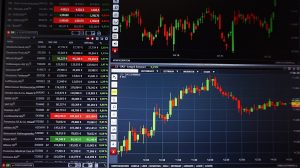What is Share Market? and Types of Share Market.
What Is the Stock Market?
The share market is a marketplace where buyers and sellers can trade publicly traded shares at specific times of day. The terms “share market” and “stock market” are frequently used interchangeably. The key difference between the two is that, while the former is only used to trade shares, the latter allows you to trade a variety of financial securities such as bonds, derivatives, forex, and so on.
The National Stock Exchange (NSE) and the Bombay Stock Exchange are India’s two main stock exchanges (BSE).

Types of Share Markets:
The two types of share markets you can trade are the Primary Share Market and the Secondary Share Market.
Primary Share Markets:
When a company first registers on the stock exchange to raise funds through shares, it enters the primary market. This is known as an Initial Public Offering , and it occurs after the company is publicly registered and its shares can be traded among market participants.
Secondary Market:
The secondary stock market is where a company’s new securities are traded after they have been sold in the primary market. Investors have the opportunity to buy and sell shares among themselves at current market prices. Typically, investors conduct these transactions through a broker or another type of intermediary who can help with the process.

Investing in the Primary Share Market:
The primary share market is accessed through an Initial Public Offering (IPO) (IPO). When a company receives all of the investor applications for an IPO, the applications are counted and shares are allotted based on demand and availability. To invest in both the primary and secondary markets, you must first open a Demat account, which stores electronic copies of your shares. Additionally, a trading account is necessary for buying and selling shares online.
In some cases, a trader may be able to apply directly from their bank account. An IPO application via net banking is made simple by a procedure known as Application Supported by Blocked Amount (ASBA).
Investing in the Secondary Share Market:
The regular purchase and sale of shares or stocks is referred to as secondary share market investing or trading. Before you begin investing in the secondary share market, there are a few simple steps to take.
Open a Demat and trading account: This is the starting point for secondary market investing. For a seamless transaction, both of these accounts should be linked to an existing bank account.
Selection of shares: Log in to your trading account and select the shares you want to sell or buy. Confirm that you have the required funds in your account to purchase those shares.
Select a price point: Decide whether you want to buy or sell a share. Wait for the buyer or seller to accept your request.
Complete the transaction: When the transaction is completed, you will receive either shares or money in exchange for the stocks you bought or sold.
What is Traded On The Share Market?

On the stock exchange, financial instruments are classified into four types. These are some examples:
Shares:
A share is a unit of equity ownership in a company. Dividends are paid to shareholders from any profits earned by the company. They also bear the brunt of any losses that the company may charge.
Bonds:
A significant amount of capital is required for a business to embark on long-term, profitable projects. Bond issuance is one method of raising capital. These bonds are a “loan” taken out by the company. Bondholders become creditors of the company and receive interest payments in the form of coupons on a regular basis. Bondholders view these bonds as fixed income instruments, receiving interest on their investment as well as their invested amount at the end of the specified period.
Mutual Funds:
These are professionally managed funds that pool the money of a large number of investors and invest it in a diverse range of financial securities. Mutual funds are available for a wide range of financial instruments, including equity, debt, and hybrid funds, to name a few.
Each mutual fund scheme issues units with a fixed value, similar to a share. You become a unit holder in the mutual fund scheme when you invest in such funds. When the instruments in that mutual fund scheme generate revenue over time, the unit holder receives that revenue in the form of the fund’s net asset value or dividend payouts.
Derivatives:
A derivative is a security that derives its value from another security. This can include a wide range of assets such as stocks, bonds, currency, commodities, and more! Buyers and sellers of derivatives have opposing expectations of an asset’s price and thus enter into a “betting contract” on its future price.
Documents required for the Opening a Demat/Trading Account:
- PAN Card
- The Aadhaar Card
- A cancelled cheque from their active bank account with the IFSC code, account number, account holder’s name, and signature.
- Documents proving that the applicant earns a stable income.
- A proof of address based on a set of documents accepted by your broker, depository participant, or bank.
- Passport-sized photographs of the applicant.
Conclusion:
When it comes to investing long-term wealth, investing in stocks is one of the best options. With the help of the stock market and a strategic investment plan, any investor can achieve their long-term financial goals.
Follow WalPencil to get to know more articles like
